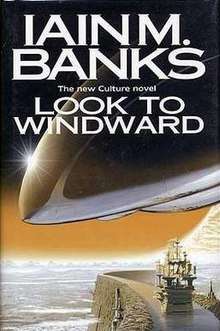Look to Windward
Look to Windward is a science fiction novel by Scottish writer Iain M. Banks, first published in 2000. It is Banks' sixth published novel to feature the Culture. The book's dedication reads: "For the Gulf War Veterans". The novel takes its title from a line in T. S. Eliot's poem The Waste Land. It is loosely a sequel to Consider Phlebas, Banks's first published Culture novel. Consider Phlebas took its name from the following line in the poem and dealt with the events of the Idiran-Culture War; Look to Windward deals with the results of the war on those who lived through it.
 First edition | |
| Author | Iain M. Banks |
|---|---|
| Audio read by | Peter Kenny |
| Cover artist | Mark Salwowski |
| Country | Scotland |
| Language | English |
| Series | The Culture |
| Genre | Science fiction |
| Publisher | Orbit Books |
Publication date | 2000 |
| Media type | Print (Hardback & Paperback) |
| Pages | 357 |
| ISBN | 1-85723-981-4 |
| OCLC | 43500306 |
| Preceded by | Inversions |
| Followed by | Matter |
Plot summary
Major Quilan has lost the will to live after the death of his wife, killed during the Chelgrian civil war that resulted from the Culture's interference. Quilan is offered the chance to avenge the Chelgrians who died by taking part in a suicide mission to strike back at the Culture. His "Soulkeeper" (a device normally used to store its owner's personality upon their death) is equipped with both the mind of a long-dead Chelgrian admiral and a device that can transport wormholes through which weapons can be delivered. Quilan is then sent to the Culture's Masaq' Orbital, ostensibly to persuade the renowned composer Mahrai Ziller to return to his native Chel but in reality on a mission to destroy the Orbital's Hub Mind. To protect him from detection at Masaq', Quilan's memory is selectively blanked until he reaches his target.
Ziller lives in self-imposed exile on Masaq', having renounced his privileged position in Chel's caste system. He has been commissioned to compose music to mark a climactic event in the Idiran-Culture War. Upon hearing of Quilan's visit, and suspicious of his reason for travel, Ziller scrupulously avoids him.
Quilan succeeds in placing the wormholes in the Orbital's Hub, but the Mind was already aware of the plot and, although not able to track the location of the other end of the wormholes, suggests that the Involved "aliens" assisting Quilan's mission may have been a group of Culture minds seeking to keep the Culture from being too complacent. Having struggled with painful memories of the Idiran-Culture war, when it was the General Systems Vehicle Lasting Damage, the Mind reveals to Quilan that it intends to cease existing and offers to take Quilan with it. They both die.
At the end of the novel, a nightmarishly efficient E-Dust Assassin is unleashed by the Culture in retribution against the Chelgrian priest who was responsible, as well as his immediate co-conspirators.
Reception
Phil Daoust in The Guardian said the story was an "enjoyable romp" and described Quilan as "one of the misguided yet decent villains who are a feature of these [Culture] tales".[1] He went on to complain of the heavy emphasis given to the consequences of war and that the Chelgrians were too thinly disguised humans.[1]
Gerald Jonas in The New York Times praised the sophistication of Banks' writing and said "he asks readers to hold in mind a great many pieces of a vast puzzle while waiting for a pattern to emerge". Jonas suggested the ending might appear to rely too much on a deus ex machina.[2]
Kirkus Reviews described it as "By turns imposing, ingenious, whimsical, and wrenching, though too amorphous to fully satisfy."[3]
Editions
- Look to Windward, Iain M. Banks, London: Orbit, 2000, ISBN 1-85723-981-4 (paperback), ISBN 1-85723-981-4 (C-format), ISBN 1-85723-969-5 (hardback)
References
- "Brushes with doom". The Guardian. Retrieved 12 March 2014.
- "Science Fiction". The New York Times. 7 October 2001. Retrieved 15 March 2014.
- "Look to Windward by Iain M. Banks". Kirkus Reviews. June 1, 2001.